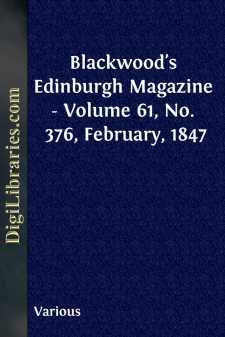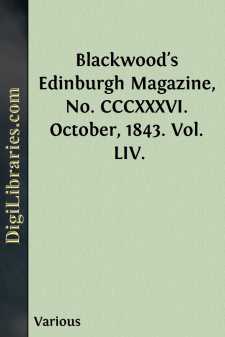Fiction
- Action & Adventure 180
- Biographical 15
- Christian 59
- Classics 6965
- Coming of Age 5
- Contemporary Women 3
- Erotica 8
- Espionage/Intrigue 12
- Fairy Tales, Folklore & Mythology 236
- Family Life 169
- Fantasy 117
- Gay 1
- General 596
- Ghost 32
- Historical 808
- Horror 43
- Humorous 159
- Jewish 25
- Legal 4
- Medical 22
- Mystery & Detective 315
- Political 49
- Psychological 41
- Religious 64
- Romance 158
- Sagas 11
- Science Fiction 730
- Sea Stories 113
- Short Stories (single author) 537
- Sports 10
- Suspense 1
- Technological 8
- Thrillers 2
- Urban Life 31
- Visionary & Metaphysical 1
- War & Military 173
- Westerns 199
Fiction Books
Sort by:
by:
Various
ETHIOPIA From the various circumstances of our day, the impression is powerfully made upon intelligent men in Europe, that some extraordinary change is about to take place in the general condition of mankind. A new ardour of human intercourse seems to be spreading through all nations. Europe has laid aside her perpetual wars, and seems to be assuming a habit of peace. Even France, hitherto the most...
more...
by:
Various
The Fairies’ Sabbath. What is a fairy? Read! [“A Wood near Athens.—Enter a Fairy on one side, and Puck on the other.]“Puck.How now, Spirit! whither wander you? Fairy.Over hill, over dale,Thorough bush, thorough brier,Over park, over pale,Thorough flood, thorough fire,I do wander ever where,Swifter than the moones sphere;And I serve the Fairy Queen,To dew her orbs upon the green:The cowslips...
more...
by:
Various
POEMS AND BALLADS OF GOETHE. No. I. It may be as well to state at the outset, that we have not the most distant intention of laying before the public the whole mass of poetry that flowed from the prolific pen of Goethe, betwixt the days of his student life at Leipsic and those of his final courtly residence at Weimar. It is of no use preserving the whole wardrobe of the dead; we do enough if we possess...
more...
by:
Various
AFFGHANISTAN. There are those persons now living who would give their own weight in sovereigns, though drawing against thirteen to sixteen stone, that all of this dreadful subject might be swallowed up by Lethe; that darkness might settle for ever upon the insanities of Cabool; and the grave close finally over the carnage of Tezeen. But it will not be. Blood will have blood, they say. The madness which...
more...
by:
Various
NORTH'S SPECIMENS OF THE BRITISH CRITICS. Dryden. Poetry, according to Lord Bacon a Third Part of Learning, must be a social interest of momentous power. That Wisest of Men—so our dear friends may have heard—extols it above history and above philosophy, as the more divine in its origin, the more immediately and intimately salutary and sanative in its use. Are not Shakspeare and Milton two of...
more...
by:
Various
HOMER, DANTE, AND MICHAEL ANGELO. There is something inexpressibly striking, it may almost be said awful, in the fame of Homer. Three thousand years have elapsed since the bard of Chios began to pour forth his strains; and their reputation, so far from declining, is on the increase. Successive nations are employed in celebrating his works; generation after generation of men are fascinated by his...
more...
by:
Various
MEMOIR OF THE LATE JOHN WILLIAM SMITH, OF THE INNER TEMPLE, BARRISTER-AT-LAW. BY SAMUEL WARREN, OF THE INNER TEMPLE, BARRISTER-AT-LAW.But the fair guerdon when we hope to find,And think to burst out into sudden blaze,Comes the blind Fury with the abhorred shears,And slits the thin-spun life. Milton.—Lycidas. The name of John William Smith, barrister-at-law, of the Inner Temple, now appears, possibly...
more...
by:
Various
If our readers have perchance stumbled upon a novel called "The Improvisatore" by one Hans Christian Andersen, a Dane by birth, they have probably regarded it in the light merely of a foreign importation to assist in supplying the enormous annual consumption of our circulating libraries, which devour books as fast as our mills do raw cotton;—with some difference, perhaps, in the result, for...
more...
by:
Various
MILL'S LOGIC. These are not degenerate days. We have still strong thinkers amongst us; men of untiring perseverance, who flinch before no difficulties, who never hide the knot which their readers are only too willing that they should let alone; men who dare write what the ninety-nine out of every hundred will pronounce a dry book; who pledge themselves, not to the public, but to their subject, and...
more...
by:
Various
MARLBOROUGH. No. I. Alexander the Great said, when he approached the tomb of Achilles, "Oh! fortunate youth, who had a Homer to be the herald of your fame!" "And well did he say so," says the Roman historian: "for, unless the Iliad had been written, the same earth which covered his body would have buried his name." Never was the truth of these words more clearly evinced than in...
more...











